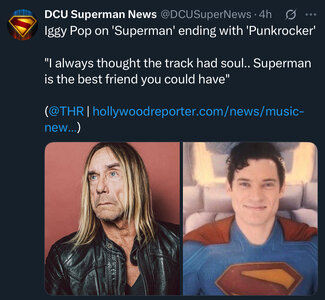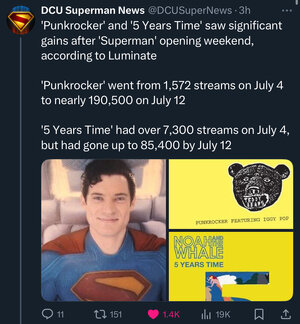Just as I feared, the score for the movie is dreadful. The music sounds interchangeable with modern trends of trailer scoring, with overly bombastic percussion and little thematic progression.
Looking at the credits on the album, there are EIGHT composers listed, not including Williams. Murphy had two additional composers working under him, while Fleming had four (one of whom worked on BvS). I don’t know why Gunn was under the impression that three distinct styles of music would gel cohesively. Neither Murphy or Fleming quote the other’s work, so it all feels haphazardly cobbled together. There’s Williams theme, some nods to Zimmer’s work (the overall soundscape and mannerisms are very similar to MoS, and there’s a direct quote of his Clark theme, as well), but the predominant atmosphere is this new trailer-esque style.
The music situation is quite similar to what happened with Age of Ultron, Ghost in the Shell or Obi-Wan, where a second, unplanned composer was brought on last-minute to clean up lingering issues. With AoU and GitS, scheduling conflicts necessitated the hiring of someone new. Whereas with Obi-Wan (which also featured music by Williams), executives considered the initial work that Natalie Holt did to be lacking that distinctive Star Wars feel. Williams was also unhappy with how his themes were being adapted, so to appease him William Ross (his longtime collaborator and orchestrator) was hired to handle any quotes of existing Star Wars music. In the end, the final product on Obi-Wan is a clumsy mishmash of Holt’s modern Zimmer-esque cues and Williams’ more traditional fare. At least with Superman, the Williams’ quotes are rendered in the same style as the rest of the score, but it also destroys what makes the theme so special in the first place.
It’s as if Murphy and Fleming recognize that Williams’ theme is iconic, but they haven’t the faintest idea of what it is about the theme that people love. They also don’t do anything interesting with it, they just plop in and slow it down, like they assume that makes it more epic or something. So in execution, they just repeat the same phrase over and over until it loses any emotional resonance. The abbreviated version of the theme lacks all of its original grandeur, so what we’re left with is merely a cheap callback. It reminds me of Elfman’s use of legacy themes in Justice League, where the inclusion of Reeve’s Superman & Keaton’s Batman themes felt weird and discordant. John Ottman’s score for Superman Returns demonstrated that it’s possible to be both imaginative and faithful at the same time. There’s not an ounce of the intelligence or soulfulness of Ottman’s Returns here, and it’s a shame.
Unfortunately, the music is a failure at respecting Williams’ music, nor does it meaningfully develop any new material with enough substance to stand on its own. Lois’ theme (or is it the Daily Planet’s?) is fine enough, but it’s a short riff, nothing more, and pale’s in comparison to Ottman’s original material (like his motif for Lex, or the new love theme).
If the composers on this film were unable to live up to Williams’ legacy, I really wish they had followed in Zimmer’s footsteps and done something completely different. It does seem that the decision to reference the 1978 theme was a mandate from Gunn, so it’s not entirely Murphy and Fleming’s fault, but that’s no excuse for how poorly implemented it was.
I may end up liking the movie (though I have my doubts, as I’ve never fully warmed to Gunn’s style), but it’s a massive bummer that the music is such a misfire. I hope one day we learn what went on behind the scenes, though.




